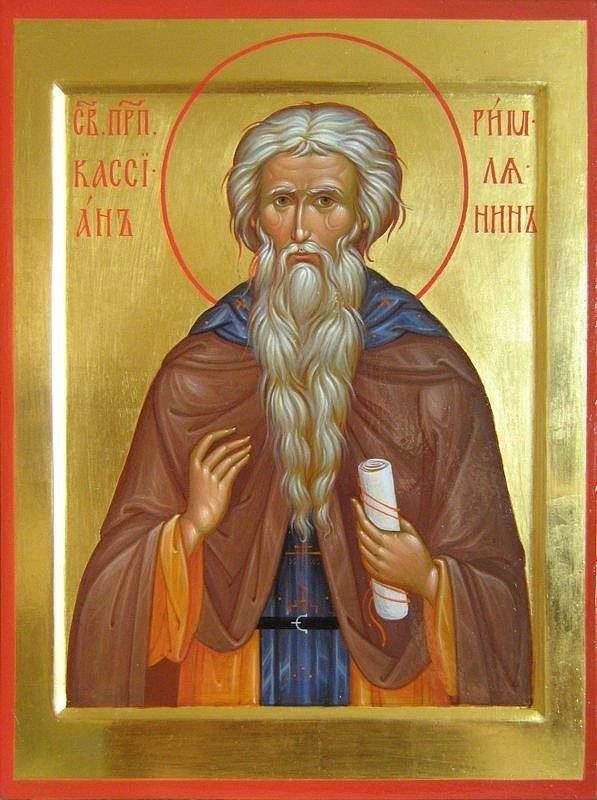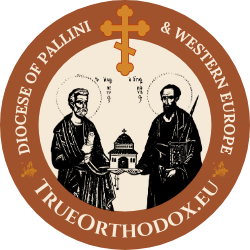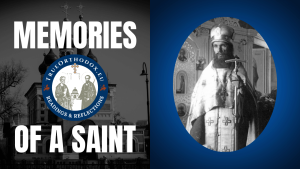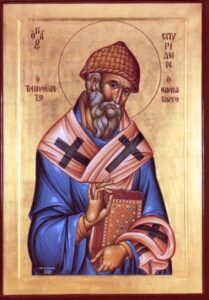Saint John Cassian the Roman – February 29

The Monk John Cassian the Roman, as to the place of birth and the language in which he wrote – belonged to the West, but the spiritual native-land of the saint was always the Orthodox East. John accepted monasticism at a Bethlehem monastery, situated at a place not far from where the Saviour was born. After a two-year stay at the monastery, in the year 390 the monk with his spiritual brother Germanus journeyed over the course of seven years through the Thebaid and Skete wilderness monasteries, drawing upon the spiritual experience of innumerable ascetics. Having returned in 397 for a brief while to Bethlehem, the spiritual brothers were ascetics for three years in complete solitude, but then they set out to Constantinople, where they attended to Sainted John Chrysostom.
Cassian was ordained to the dignity of presbyter in his own native land. At Massilia (Marseilles) in Gallia (Gaul, now France) he first established there two coenobitic (life-in-common) monasteries, a men’s and a women’s, on the order of monastic-rules of Eastern monasticism. At the request of Bishop Castor of Aptia Julia (in Gallia Narbonensis), the Monk Cassian in the years 417-419 wrote 12 books entitled “De Institutis Coenobiorum” (“On the Directives of Coenobitic Life”) from the Palestinian and Egyptian monks and including 10 conversations with the desert fathers, so as to provide his fellow countrymen examples of life in common (cenobitic) monasteries and acquaint them with the spirit of the asceticism of the Orthodox East. In the first book of “De Institutis Coenobiorum” the talk concerns the external appearance of the monastic; in the second – concerning the order of the night psalms and prayers; in the third – concerning the order of the daytime prayers and psalms; in the fourth – concerning the order of renunciation from the world; in the eight remaining books – concerning eight chief sins.
In the conversations of the fathers, Saint Cassian as a guide within asceticism speaks about the purpose of life, about spiritual discernment, about the degrees of renunciation from the world, about the passions of the flesh and spirit, about the eight sins, about the hardship of the righteous, and about prayer.
In the years following, the St. Cassian described another fourteen (or else twenty-four) “Conversations of the Fathers” (the “Collationes Patrum”): about the perfection of love, about purity, about the help of God, about the comprehending of Scripture, about the gifts of God, about friendship, about the use of language, about the four levels of monasticism, about solitary hermetic life and coenobitic life-in-common, about repentance, about fasting, about nightly meditations, about spiritual mortification – this last given the explanatory title “I want not to, yet this I do”.
In the year 431 Saint John Cassian wrote his final work, the “Against Nestorius” (“De incarnationem Domini contra Nestorium” – literally “On the Incarnation of the Lord, against Nestorius”). In it, he gathered together against the heresy opinions of censure of many Eastern and Western teachers. In his works the St. John Cassian grounded himself in the spiritual experience of the ascetics, meriting the admiration of Blessed Augustine (Comm. 15 June), that “grace far least of all is defensible by pompous words and loquacious contention, by dialectic syllogisms and the eloquence of a Cicero”. In the words of St. John of the Ladder, “great Cassian discerns loftily and quite excellently”. Saint John Cassian the Roman reposed peacefully in the year 435.
© 1996-2001 by translator Fr. S. Janos.








